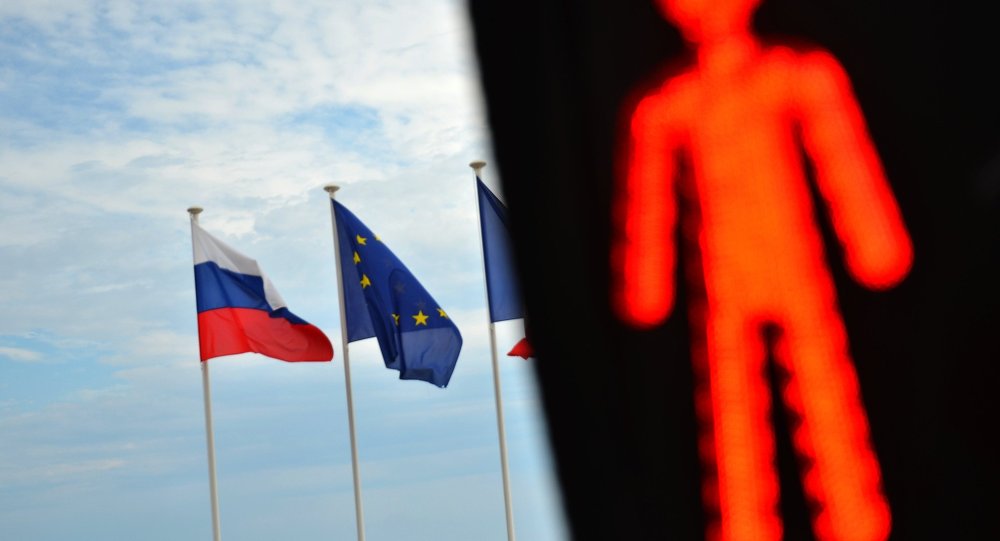The European Union intends to extend its anti-Russian sanctions for another six months, despite the fact that some of its member states have called for an easing of the restrictive measures, according to The Financial Times.

© Sputnik/ Vladimir Sergeev
Originally appeared at Sputniknews
With some EU countries calling for softening the restrictive measures against Moscow, Brussels is, however, set “to roll over its Ukraine-related sanctions against Russia for a further six months,” the Financial Times reported.
According to the Financial Times, diplomats fear that the issue may spark a confrontation between the countries which urged a review of sanctions, such as Italy, France, Hungary and Greece, and those who are in favor of the extension of the restrictive measures, including Poland and the Baltic States.
The newspaper quoted sources in Brussels as saying that European politicians are inclined to extend the restrictions, as “the more dovish states postponed their demands for a big rethink on the sanctions until a EU leaders’ summit, set for December.”
#Lavrov: Regrettably, EU is following suit of the US, resorting to similar methods & habits, going to sanctions at the first sign of trouble
— MFA Russia (@mfa_russia) June 1, 2016
The Financial Times recalled that the EU had slapped sanctions against Russia targeting Russia’s financial services, energy and defense sectors in response to Crimea’s reunification with Russia in 2014 and Moscow’s alleged role in the Ukraine crisis.
“While there is still a discussion over whether the final decision will be taken at a summit of EU leaders in late June, officials say there is little doubt the sanctions, which are due to expire on July 31, will be prolonged for six months,” the newspaper said.
At the same time, the Financial Times cited a senior EU official as saying that some EU countries “are considering whether to send a political signal to Moscow”, in a sign that “Europe’s sanctions policy is nearing a turning point.”
“Sooner or later we need a deep and detailed discussion on the Russia sanctions, but I expect the December [summit] to be the right moment for this,” another high-ranking EU official was quoted by the Financial Times as saying.
The newspaper also recalled that earlier this week, French MPs overwhelmingly approved a non-binding resolution calling for sanctions on Russia to be “gradually and partially” lifted.
However, the Financial Times added, “the move is not expected to change French President Francois Hollande’s support for a six-month rollover.”
Meanwhile, the Russian newspaper Izvestia has quoted Yves Pozzo di Borgo, deputy chairman of the French Senate’s European Affairs Committee, as saying that the French MPs will submit a resolution on the abolition of the anti-Russian sanctions during the upcoming EU parliamentary conference.
The Conference of Parliamentary Committees for Union Affairs of the Parliaments of the European Union is due to be held between June 13 and June 14 in The Hague.
The extension of the anti-Russian sanctions will be high on the agenda of the two-day EU summit, which kicks off on June 28. Hungary, Cyprus, Greece, Italy and Slovakia are expected to call for the easing or lifting of the restrictive measures.




The Germans have this wonderful word “Chefsache”: the sanctions war concerns the power balance in Europe, and therefore is a sovereign American decision. We should be grateful for every tiny ray of honesty that makes it through the murk. At the G7, Obama stated that the sanctions will be continued and that’s the end of it. He’s clearly tired of it all, just a few more miserable months and he can start enjoying the money. He really can’t be bothered with those nincompoops in Brussels, and the charade of making it looks like it’s their own decision.
–
Even if the sanctions were lifted yesterday, much of their damage would be irreversible, for alternate suppliers and import substitutes have meanwhile been found. And this is of course how it was intended from the start. Claims that the sanctions will be reviewed in December are just to pacify the domestic EU audience. Not sure if reporting those claims uncritically is the best way to go about it.